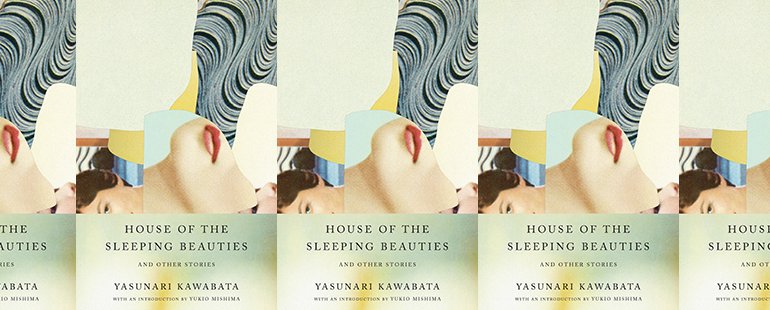Kawabata Yasunari’s House of the Sleeping Beauties and the Male Gaze

Kawabata Yasunari’s 1961 novella House of the Sleeping Beauties is almost Beckettian in its simplicity: the elderly Eguchi has been introduced to a sort of sexless fetish house in which rich old men, impotent with age, pay to sleep beside beautiful young women in a chaste embrace. The women have been drugged, so there is no fear of their waking, and the men are free to gaze at their naked bodies in complete privacy, without fear or shame, and then to take the tranquilizers that have been provided by the house so that they may sleep next to them. The point is not sex, but a deep, restorative sleep—the sleep of a young man.
This almost-but-not-quite surreal premise allows Kawabata to take the idea of the male gaze and make it concrete, a laboratory in which to test our preconceptions about masculinity and male privilege. The entire story takes place within the confines of the fetish house over a series of visits in which Eguchi watches a woman—always a different woman—shift and dream beside him. The sleeping women are described in precise, evocative detail until they become numinous presences: distinct in their personalities, brimming with the vitality of life, and yet dead to the world. They are, of course, empty mirrors for Eguchi’s erotic longings, but they are also aggressively present, in the way that a cliff or a river is present, and they push back against his desire for imaginative control, insinuating the essential truth of his powerlessness. The experience of lying beside them is thus both seductive and maddening.
Eguchi’s conflicted feelings emerge right away. Slipping into the quilts beside the first of his sleeping women, he is excited by what he finds: beauty, youth, vitality, a safely contained erotic power. But then something shifts inside of him, and his mood darkens; the sleeping woman’s inability to acknowledge his presence suddenly feels like a willful refusal, a threat of erasure. In Edward Seidensticker’s 1969 translation from the original Japanese, we learn that “A moment had come in which the old man could not bear the fact that the girl was sleeping, that she did not speak, that she did not know his face and his voice; that she knew nothing of what was happening, that she did not know the man Eguchi who was with her. Not the smallest part of his existence reached her.” The feeling dissipates, and Eguchi lies quietly beside her, his mind ranging over memories of the women in his life. He recalls a series of love affairs notable for their coldness and a certain predatory quality that will probably feel familiar to many readers. These intermix with distant, dissatisfied memories of his grown daughters and grandchildren. Something dark has been stirred up inside him: with each memory, he seems to be asking himself whether the moment made him feel fully alive. Though he eventually swallows the sleeping pills by his bedside, the evening ends not in the blissful rest promised to him, but in a nightmare that forces him awake.
Nevertheless, when the proprietress of the house calls him a few weeks later, he goes back, not so much despite as because of his misgivings. When he gets there, his reaction to the second of the sleeping beauties is more volatile, more aggressive. She is a young witch, he believes, an enchantress; though she is asleep, unaware of his presence, he sees none of this as projection. Whatever he feels, whatever he ends up doing, is her fault, not his: “It did not seem likely that Eguchi could be as reticent as he had been with the other girl. This was a girl who, whether sleeping or awake, called out to a man—so strongly that, were he to violate the rule of the house, he could only blame the misdeed on her.” “The rule of the house” is that the sleeping beauties must not be harmed. The proprietress has told him this a number of times, adding that she only invites gentlemen she can trust, meaning elderly men who can no longer function sexually. But Eguchi is not impotent like the others, and therefore not really a guest to be trusted. “He would now have revenge on this slave maiden,” he thinks, “for all the contempt and derision endured by the old men who frequented the house.” He stops only when he comes upon “clear evidence of her virginity.”
This last-second decision to abide by the house rule leaves him filled with a twisted sort of self-loathing. “That the ‘experienced’ witch tonight was still a virgin,” he tells himself, “was less the mark of the old men’s respect for their promises than the grim mark of their decline. The purity of the girl was like the ugliness of the old men.” In other words, Eguchi sees his failure to do harm as a form of weakness, a sign that he is no longer a man.
Perhaps it is this sense of failure that propels him back for yet another visit. The third of the sleeping women is clearly younger than the others; the proprietress describes her as “in training.” Deeply asleep, she parts her lips and sticks out her tongue; this reminds him of a woman with whom he had an affair while visiting Kobe, and then of a teenage prostitute on a different trip with whom he couldn’t bring himself to have sex. The flow of memories leads to a moment of fleeting self-awareness:
The impulse toward a misdeed more exciting than putting his finger to her tongue flashed through him. But the misdeed did not take clear shape in Eguchi’s mind as cruelty and terror. What was the very worst thing a man could do to a woman? The affairs with the Kobe woman and the fourteen-year-old prostitute, for instance, were of but a moment in a long life, and they flowed away in a moment. To marry, to rear his daughters, these things were on the surface good; but to have had the long years in his power, to have controlled their lives, to have warped their natures even, these might be evil things. Perhaps, beguiled by custom and order, one’s sense of evil went numb. Lying beside a girl who had been put to sleep was doubtless evil.
And yet this chain of thought suddenly veers in an unexpected direction. “The evil would become clearer were he to kill her,” he thinks. “It would be easy to strangle her, or to cover her nose and mouth.” The impulse is so unsettling that Eguchi gets out of bed and rings the emergency call button, planning to ask the proprietress of the house for the same powerful drug that the women receive. It’s as if he wants to be like them, dead to the world, but also safe from them, and to make them safe from him. But the proprietress does not answer, and when the feeling of desperation passes, he goes back to bed to wait for morning.
All of these strands intertwine on his next visit, when Eguchi tells the proprietress that he wants to meet one of the sleeping beauties out in the real world, awake. The proprietress answers that this is impossible, a line that must never be crossed, and then adds, “I would imagine that over the years you’ve made a great many women weep.” When Eguchi professes shock, she responds, “I think you protest too much.” What follows is a fraught exchange, conveyed in Kawabata’s typically clipped, almost notational dialogue. Eguchi asks her almost plaintively, “What is the worst thing an old man can do?” It’s as if he’s seeking a reaffirmation of “the house rule.” But the proprietress offers him only the terror of complete license:
‘There are no bad things in this house.’ She lowered her youthful voice, which seemed to impose itself upon him with a new force.
‘No bad things?’
The woman’s dark eyes were calm. ‘Of course, if you were to try to strangle one of the girls, it would be like wrenching the arm of a baby.’
The remark was distasteful. ‘She wouldn’t even wake up then?’
‘I think not.’
‘Made to order if you wanted to commit suicide and take somebody with you.’
‘Please do, if you feel lonely about doing it by yourself.’
‘And when you’re too lonely even for suicide?’
‘I suppose there are such times for old people.’ As always, her manner was calm.
There is something unnerving about this conversation—the reader feels the action ratcheting up to a new level. For just a moment, Kawabata lets go of his tight focus on Eguchi, pulls back the camera and gives us a wider angle on the situation: what we see is not simply his protagonist’s reckless confusion, or a psychic illness infecting only the male of the species, but a cultural system that enlists everyone, men and women, in a cruel set of assumptions about human relations.
This level of insight is impressive given that House of the Sleeping Beauties was published in 1961, by a writer born in the nineteenth century and already in his sixties. It predates feminist theory, gender studies, and decades of feminist fiction, but manages to feel completely of the current moment. Kawabata’s take on masculinity and the male gaze—like so much feminist writing—is so deeply intuitive, so original, that it makes the subject seem new. One interesting result is that the novel feels like a page-turner, despite its claustrophobic setting and minimalistic plot. By the time Eguchi and the proprietress have their conversation, the sense of impending doom is almost unbearable; twenty-five pages later, the story ends in a moment of violence and moral complicity that manages to feel both preordained and shocking. Mishima Yukio, an acute reader, was exactly right when he likened Sleeping Beauties, in his introduction to the book, to “a submarine in which people are trapped and the air is gradually disappearing.” On the last page, we are left gasping.


